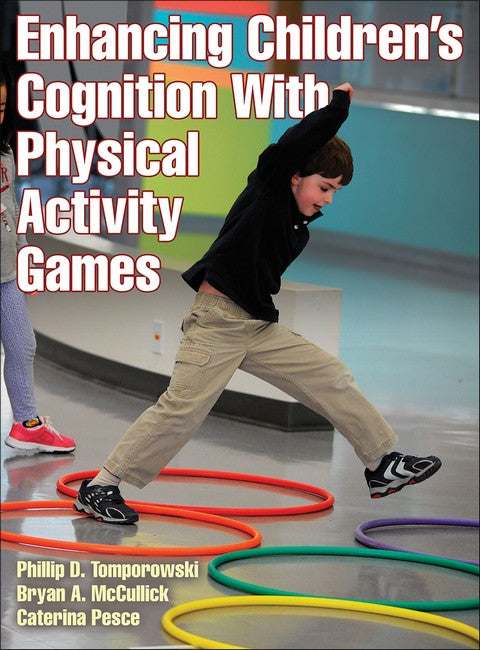Phillip D. Tomporowski, PhD, is a professor of kinesiology at the University of Georgia. An experimental psychologist, Tomporowski has been involved in the study of learning and the effects of exercise on mental functions for four decades. He has authored, coauthored, or edited five books and contributed chapters to a dozen of other books. He is widely published in journals on cognitive function and exercise issues in children and has received numerous grants to conduct studies in these and related areas. Tomporowski is a sought-after speaker at symposia and conventions. He is a fellow of the American College of Sports Medicine and a member of the American Psychological Society. He enjoys participating and instructing in the martial arts and taking part in triathlons and obstacle races. Caterina Pesce, PhD, is a professor in the department of movement, human and health science at the Italian University Sport and Movement in Rome. She is a former physical education teacher with higher education in both sport science and experimental psychology. Since 2003 she has taught in higher education on physical activity for children. Her research focus has been on the effects of physical exercise on cognitive functioning. She coauthored a book on exercise and cognitive function and has authored or coauthored more than three dozen research publications in sport and exercise psychology and physical education. Pesce is a member of the Italian Society of Movement and Sport Sciences, associate editor for Journal of Aging and Physical Activity, a board member of the Journal of Sport and Exercise Psychology, and a board member of the Italian national program of motor literacy for elementary schools. She enjoys jogging and singing and, above all, being a mother. Bryan A. McCullick, PhD, is a professor of kinesiology at the University of Georgia. He is a former physical education teacher and has been a physical education teacher educator since 1997. He has given numerous keynote addresses at conferences related to physical education, physical activity, and teacher training. McCullick has coauthored two books, contributed numerous chapters in books, and written more than 40 journal articles. He has also received numerous grants to conduct research and received awards and recognitions, including winning the Mabel Lee Award from AAHPERD. McCullick is a fellow in the SHAPE America Research Consortium, has been associate editor for Research Quarterly for Exercise and Sport (RQES) and is on the RQES editorial board, was vice president of the Association Internationale des Ecoles Superieures d'Education Physique (AIESEP), and has served on many other editorial boards. Among his joys are being a father and a husband, playing golf (poorly), and following the Alabama Crimson Tide and the Miami Dolphins.
Request Academic Copy
Please copy the ISBN for submitting review copy form
Description
Part I Physical Activity and Mental Development Chapter 1 Understanding Children's Mental Development Mental Development Skill and the Trajectory of Cognitive Development Understanding Children's Development From Multiple Points of View Implications for Educators Chapter 2 How Movement Influences Children's Mental Development Children's Physical Activity Physical Activity in Natural, Educational, and Recreational Settings How Physical Activity and Exercise Enhance Children's Cognition How Physical Activity Benefits Children's Cognition and Academics Implication for Educators Chapter 3 How Movement Games Help Children Think and Learn Learning What Influences the Shape of the Learning Curve? Mental Energy and Children's Learning Developmental Tasks and Readiness to Learn Implication for Educators Chapter 4 Motivating Children to Learn by Playing Motivation to Play Games Challenge and Children's Development Creating a Motivational Climate for Learning and Enjoyment Implication for Educators Part II Translating Research to Practice Chapter 5 Capitalizing on Physical Activity to Benefit Children's Physical and Mental Health How Physical Movements Create Mental Maps Childhood Inactivity and Sedentary Behavior Worldwide Trends in Childhood Obesity and Health Children's and Adolescents' Mental Health Implication for Educators Chapter 6 Engaging Children in Playful Learning Children's Mental Engagement Three Principles of Instruction Teaching for Engagement Implication for Educators Chapter 7 Teaching Physical Activity Games for Cognitive Engagement Who Are Physical Activity Teachers? Skills Needed by Physical Activity Teachers Selecting an Approach to Teaching Enhancing the Effectiveness of Teaching Models Considerations for Implementing Physical Activity Games Programs Implication for Educators Chapter 8 How to Assess Children at Play What Is Assessment and Why Do It? Selecting the Right Indicators of Program Success Indicators of Program Effectiveness Approaches to and Sources of Data Collection Individual Differences, Measurement, and Game Development Implication for Educators Chapter 9 Integrating Physical Activity Games Into the Home and Community Ecological Models Applying Physical Activity Games to Ecological Models 21st-Century Schools Implication for Educators Part III Creating Effective Physical Activity Games Chapter 10 Physical Activity Games for Preschool- and Kindergarten-Age Children Moving From Play to Games Games That Challenge Executive Functions Connecting Games for Preschool- and Kindergarten-Age Children to SHAPE America Standards Games Highlighting Contextual Interference Games Emphasizing Mental Control Games Highlighting Discovery Implication for Educators Chapter 11 Physical Activity Games for Elementary School-Age Children Games That Challenge Executive Functions Connecting Games for Elementary School-Age Children to SHAPE America Standards Games Highlighting Contextual Interference Games Emphasizing Mental Control Games Promoting Discovery Implication for Educators

